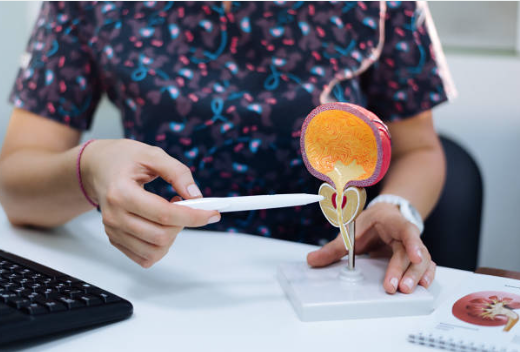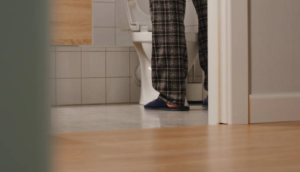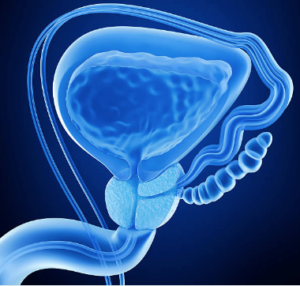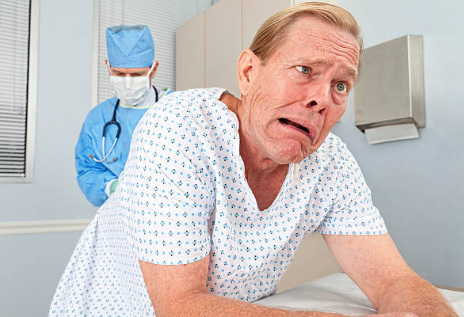Overactive bladder: Your Nighttime Battle
 Your Nighttime Battle: Overactive Bladder and Frequent Urination
Your Nighttime Battle: Overactive Bladder and Frequent Urination
Picture this: You’re finally enjoying deep sleep, only to be jolted awake by an insistent urge to pee. It’s a frustrating, exhausting cycle you know all too well. If you’re a man over 40, chances are you’re no stranger to these disruptive nighttime bathroom trips caused by an overactive bladder.
Why is My Bladder Betraying Me? Understanding Frequent Urination in Men
Let’s face it, frequent urination doesn’t just wreck your sleep; it can chip away at your confidence and quality of life. But what’s causing those sudden urges and why are they so common as we age?
1. The Prostate Factor: Benign Prostatic Hyperplasia (BPH) – A Common Culprit for Frequent Urination in Men
Your prostate, that walnut-sized gland that plays a key role in reproduction, tends to enlarge with age – especially after 40. This age-related enlargement is called Benign Prostatic Hyperplasia (BPH), and it’s incredibly common. In fact, over half of men in their 60s and up to 90% of men in their 70s and 80s will have some degree of BPH.
How Does BPH Lead to an Overactive Bladder?
Imagine your urethra, the tube that carries urine from your bladder, as a garden hose. When your prostate enlarges, it’s like someone stepping on the hose, restricting the flow. This puts pressure on your bladder, making it feel like it needs to empty frequently, even when it’s not really full.
Key Symptoms of BPH and Frequent Urination in Men
It’s not just the constant bathroom breaks – BPH can bring along a set of other bothersome symptoms:
- Urgent Need to Go: That sudden, can’t-wait feeling that sends you rushing to the toilet.
- Weak Urine Flow: Difficulty getting started or a dribbling, hesitant stream.
- Straining to Urinate: Having to push or strain to empty your bladder.
- Feeling Like You Can’t Fully Empty: Even after going, you feel like there’s still some left.
- Frequent Urination in Men at Night: Disruptive nighttime bathroom trips (nocturia).
2. Oversensitive Bladder Muscles: The Urge That Can’t Wait
Sometimes, your bladder muscles just get a bit…twitchy. They contract without warning, leaving you scrambling for the bathroom. This condition, known as overactive bladder (OAB), can seriously disrupt your day-to-day life. So, what’s behind those sudden urges, and how can you manage them?
Potential Causes of Overactive Bladder in Men
- Infections: Urinary tract infections (UTIs) can irritate your bladder lining, leading to frequent urination and a sense of urgency.
- Bladder Stones: These irritating mineral deposits can trigger bladder spasms and frequent urination in men.
- Weakened pelvic floor muscles: These muscles support your bladder. If they weaken, your bladder control could suffer.
- Nerve damage: Conditions like diabetes or neurological disorders can damage the nerves that control bladder function.
- Excess Caffeine or Alcohol Intake: These diuretics push your bladder to work overtime.
- Medication Side Effects: Certain medications can contribute to overactive bladder symptoms.
Additional Factors Triggering Frequent Urination in Men
Beyond overactive bladder, frequent urination could also be caused by:
- Constipation: A full rectum can press on your bladder, creating that gotta-go feeling.
- Anxiety: Stress and anxiety can lead to increased muscle tension, including in your bladder.
Don’t Ignore the Signs: When to See a Doctor about Frequent Urination in Men
While many cases are manageable, getting checked ensures you receive the right treatment. See a doctor urgently if you experience:
- Pain or Burning during Urination: This could indicate an infection.
- Blood in Urine: This could signal a serious underlying problem.
- Difficulty Starting or Stopping Your Urine Stream: Could point to prostate issues.
3. Diabetes: The Sweet Disruptor of Bladder Control
Uncontrolled diabetes can throw a wrench into your bladder’s routine. Here’s how those high blood sugar levels wreak havoc:
- The Thirst Trap: When blood sugar soars, your kidneys desperately try to filter it out. This triggers intense thirst, making you drink more fluids – and you guessed it, that means more trips to the bathroom.
- The Sugar Flood: Your kidneys can only handle so much. Any excess sugar gets dumped into your urine, further increasing urine volume and straining your bladder.
- Nerve Damage: Over time, high blood sugar can damage the nerves controlling your bladder. This disrupts the signals that keep things in sync, leading to frequent urination (and sometimes, leakage).
Important Note: If you frequently urinate, especially at night, and find yourself constantly thirsty despite drinking plenty of fluids, get your blood sugar tested. It’s a crucial step towards managing diabetes and restoring bladder control.
4. Neurological Roadblocks: When Brain-Bladder Signals Malfunction
Sometimes, the communication between your brain and bladder gets scrambled, leading to frustrating urgency and frequent urination. Several neurological conditions can cause this disruption:
-
Parkinson’s Disease: Degeneration That Impacts More Than Movement Parkinson’s disease causes tremors and stiffness, but it also affects the nerves that control your bladder. This can lead to either overactive bladder symptoms (urgency, frequency) or difficulty emptying your bladder completely.
-
Stroke: When Brain Damage Extends to the Bladder A stroke can damage the parts of the brain responsible for bladder control. Depending on the location of the damage, it can lead to different bladder-related issues, including frequent urination.
-
Multiple Sclerosis (MS): An Unpredictable Foe MS is a disease that attacks the protective coating of nerves throughout your body. This disrupts those vital brain-bladder signals, leading to problems like frequent urination, urgency, or hesitancy (difficulty starting a urine stream).
-
Spinal Cord Injuries: Severed Communication Pathways Damage to the spinal cord can block the messages that coordinate bladder function. This can cause the bladder to become overactive or underactive, impacting your ability to hold or release urine normally.
Don’t Ignore the Signals: Seek Neurological Expertise
If you have any neurological condition, even a mild one, keep a close eye on your bladder habits. Changes in frequency or urgency could signal a change in your condition and warrant a conversation with your neurologist or a specialist in urology.
5. Medication Mishaps: Are Your Meds to Blame?
It’s surprising how often something as simple as a prescription medication can be the root cause of frequent urination in men. Be sure to scrutinize your current prescriptions and over-the-counter treatments:
- Diuretics: The Water Pill Culprit These medications, often prescribed for high blood pressure, are designed to make you urinate more. This can become a vicious cycle, disrupting your sleep and overall quality of life.
- Antidepressants and Antihistamines: Hidden Side Effects While primarily designed for other conditions, some antidepressants and antihistamines can make it harder to fully empty your bladder, leading to more frequent trips to the bathroom.
- The Calcium Channel Blocker Connection Used to treat high blood pressure and other conditions, these medications can relax bladder muscles, sometimes leading to increased urgency and frequency.
Don’t Suffer in Silence: Talk to Your Doctor
Never stop a medication without consulting your doctor first. However, being open about your frequent urination troubles, and providing a complete list of medications you take, can be a game-changer. Your doctor may be able to:
- Adjust dosages: Sometimes lowering the dose can reduce side effects without impacting the medication’s effectiveness.
- Switch you to alternatives: There may be different medications within the same class with fewer bladder-related side effects.
- Provide strategies: Your doctor might recommend ways to manage frequent urination while staying on your necessary medication.
6. Your Daily Drinks: Is Caffeine or Alcohol the Culprit?
Think those innocent cups of coffee and evening beers are harmless? Think again. Your daily beverages might be waging a secret war against your bladder, leading to frequent urination in men.
-
The Caffeine Conundrum: Caffeine is a powerful diuretic, meaning it makes your kidneys produce more urine. That morning coffee, energy drink, or even your favorite tea could be sending you on extra bathroom breaks.
-
Alcohol’s Double Trouble: It’s not just a diuretic, alcohol also irritates the bladder lining. This leads to both increased urine production and a heightened sense of urgency, worsening those frequent urination in men at night problems.

The Hydration Puzzle: How Much Water Should I Drink?
You might think the answer to frequent bathroom trips is drinking less, right? Wrong! Dehydration can actually make things worse. Here’s why:
- Concentrated Urine: Less water means your urine becomes more concentrated, further irritating your bladder.
- Tricky Signals: Your bladder may overreact to even small amounts of urine, causing frequent urination.
The Smart Sipping Strategy
- Spread Out Your Intake: Sip water throughout the day rather than downing a huge amount at once.
- Cut Back Before Bedtime: Limit fluids 2-3 hours before sleep to reduce those nighttime bathroom breaks caused by frequent urination in men.
- Know Your Triggers: Pay attention to which beverages worsen your symptoms and limit them accordingly.
Bonus Tip: Substitute Bladder-Friendly Drinks
Swap out some of those coffee and alcohol culprits for options like:
- Herbal teas: Rooibos, chamomile, and nettle can be soothing.
- Water with flavor: Add lemon, cucumber, or berries for a refreshing touch.
- Diluted fruit juices: Get some vitamins, but mix them with water to avoid sugar overload.
Waking Up Exhausted: Causes of Frequent Urination in Men at Night
Nocturia – that relentless need to visit the bathroom throughout the night – wreaks havoc on your sleep. It’s not only disruptive, but those dark trips to the bathroom increase your risk of falls and injuries. Let’s delve into why this happens and, more importantly, what you can do about it:
-
Your Body’s Fluid Shift: The Nighttime Redistribution Lying down at night triggers a shift in fluids throughout your body. This can lead to increased pressure on your bladder and kidneys, resulting in more urine production while you’re trying to sleep.
-
Reduced Bladder Capacity: It Happens with Age As the years pass, your bladder might not hold the same volume it used to. These changes mean even a small amount of urine can trigger the urge to go, leading to frequent nighttime disruptions.
-
Other Sleep Disorders: The Sneaky Culprit Conditions like obstructive sleep apnea (OSA) cause pauses in your breathing throughout the night. These pauses not only interrupt your sleep but can also lead to frequent urges to urinate.
-
The Heart Connection: When Fluid Overload is the Issue Conditions like congestive heart failure can cause fluid to build up in your legs (edema) throughout the day. When you lie down at night, this fluid redistributes, putting extra strain on your kidneys, and causing frequent urination in men.
Don’t Despair: Solutions to Reclaim Restful Nights
Don’t resign yourself to a life of broken sleep! Here are some tactics to consider:
-
Timing Matters: Limit your fluid intake in the hours leading up to bedtime, especially caffeinated or alcoholic beverages.
-
Elevate Your Evenings: If you have swelling in your legs, try elevating them slightly before bed to help that excess fluid return to your bloodstream before sleep.
-
Prostate Cancer: The Risk You Mustn’t Ignore Though less common than benign prostate enlargement, prostate cancer must be ruled out. Pay extra attention if you experience other red flags, such as:
- Difficulty starting urination
- Weak or interrupted urine flow
- Blood in urine or semen
- Discomfort in the pelvic area
- Bone pain
- Unexplained weight loss
-
Urinary Tract Infection (UTI): Catch It Early UTIs are very common, especially as you get older. These infections can make your bladder irritable and contribute to frequent urination. Look out for these warning signs:
- Urgent need to urinate, even with little urine output
- Burning or painful sensation during urination
- Cloudy or strong-smelling urine
- Lower abdominal discomfort
-
Bladder Stones or Tumors: Rare But Require Attention While less likely, bladder stones or tumors can sometimes be the root cause of frequent urination. Potential red flags include:
- Blood in your urine
- Painful urination
- Lower back/abdominal pain
The Importance of Early Detection
Catching any of these conditions early significantly increases your chances of successful treatment. Don’t hesitate to talk to your doctor if you notice changes in your urination patterns or additional troubling symptoms.
Additional Factors That May Signal Serious Concerns
Consider seeking medical attention if you experience:
- Complete Inability to Urinate: This is a medical emergency and requires immediate attention.
- Frequent Urination with Fever and Chills: This combination might indicate a kidney infection, which needs prompt treatment.
Solutions that Work: Managing Frequent Urination in Men Over 50
The good news: You don’t have to just surrender to bathroom sprints! Here’s how to break the cycle:
1. Team Up with Your Doctor: The Power of Diagnosis
A checkup with your doctor is the first essential step to managing frequent urination in men. A comprehensive evaluation is key, including:
- Medical History Review: Discussing your symptoms, overall health, and any medications is key for identifying potential causes.
- Physical Exam: Your doctor may check your prostate to assess for possible enlargement.
- Urine Tests: A simple urine sample helps check for infections, blood in the urine, or other potential issues.
- Further Tests: Depending on your symptoms, your doctor might recommend additional tests such as a bladder function test, ultrasound, or other imaging studies.
A precise diagnosis is crucial, as it will determine the most effective treatment strategies for your frequent urination in men over 50.
2. Treatment Options Tailored to Your Needs
Depending on the underlying cause, your doctor may recommend a combination of approaches for relief:
-
Lifestyle Changes: Often, simple adjustments can make a big difference. These might include:
- Bladder Training: Scheduling bathroom breaks to gradually increase bladder capacity.
- Reducing Fluid Intake: Especially before bedtime.
- Managing Caffeine & Alcohol: Minimizing or cutting out these bladder irritants.
- Pelvic Floor Exercises: Strengthening these muscles can help with bladder control.
-
Medications: Your doctor may prescribe medications to address various causes:
- BPH medications: Drugs to shrink the prostate or relax bladder muscles.
- Overactive bladder medications: Medications to help calm overactive bladder contractions.
- Antibiotics: To fight urinary tract infections.
-
Surgery: For severe cases of BPH that don’t respond to medication, surgical procedures may be recommended to reduce prostate size and improve urine flow.
Additional Tips for Taking Control
- Track Your Symptoms: Keep a diary of when and how often you urinate, along with fluid intake, to uncover patterns and help your doctor.
- Manage Stress: Stress and anxiety can worsen bladder control problems.
- Maintain a Healthy Weight: Excess weight can put added pressure on your bladder.
Remember: Patience and Partnership
Finding the right treatment for frequent urination in men may take time and open communication with your doctor is essential. You don’t have to fight this alone!

FAQs: Your Frequent Urination Questions Answered
FAQ-1: Is frequent urination in men a normal part of aging?
ANSWER: While frequent urination becomes more common with age, it’s not necessarily a “normal” part of aging. It’s important to talk to your doctor to identify underlying causes and get appropriate treatment.
FAQ-2: What’s the difference between overactive bladder and BPH?
ANSWER: Both can lead to frequent urination in men, but they have different causes:
- Overactive bladder: Caused by overactive bladder muscles that contract too readily.
- BPH (Benign Prostatic Hyperplasia): Caused by an enlarged prostate that obstructs urine flow.
FAQ-3: If I have frequent urination in men at night, does it mean I have a serious condition?
ANSWER: While frequent urination at night (nocturia) can disrupt sleep, it doesn’t always indicate a serious condition. Often, adjusting your fluid intake before bed or treating an underlying cause like BPH can provide relief. However, it’s best to consult your doctor for a proper diagnosis.
FAQ-4: Can lifestyle changes help with frequent urination in men over 50?
ANSWER: Absolutely! Lifestyle changes often play a significant role in managing frequent urination. These include bladder training, reducing caffeine and alcohol intake, and pelvic floor exercises.
FAQ-5: When should I see a doctor about frequent urination?
ANSWER: It’s best to see your doctor if frequent urination significantly impacts your daily life or if you experience other concerning symptoms like:
- Pain or burning during urination
- Blood in your urine
- Difficulty starting or stopping urination
- Fever or chills
SEE ALSO: Latest Prostate Supplements >>
NOTE :
The information provided in this article and the rest of this website is intended for general knowledge and informational purposes only, and does not constitute medical advice. It is essential to consult a qualified healthcare professional for the diagnosis and treatment of any health condition. Never disregard professional medical advice or delay in seeking it because of something you have read in this article.

